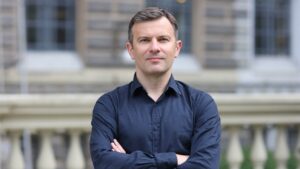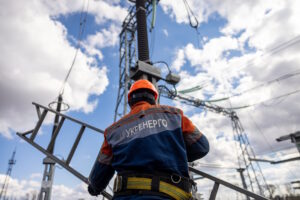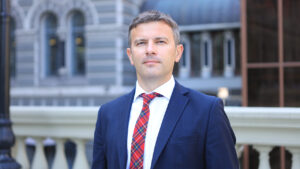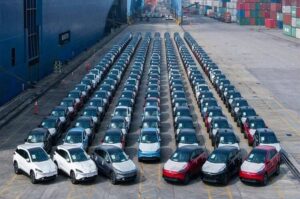
The demographic situation and migration will be decisive factors for Ukraine’s economy in the medium term, said First Deputy Head of the NBU Serhiy Nikolaychuk in an exclusive interview with Interfax-Ukraine news agency.
“The labor shortage and aging population directly affect the labor market, wage levels, and inflation. We pay close attention to this in our forecasts,” he said.
According to him, the return of migrants and the attraction of women, students, pensioners, and veterans to the labor market help alleviate the problem, but in the long term, systemic solutions are needed, including in the areas of education and social policy.

NPC Ukrenergo has fully completed the construction of the first phase of passive protection facilities for its substations (PS), and the second phase is scheduled for completion in the first quarter of 2026, according to Yuriy Boyko, a member of the NPC’s supervisory board.
“There are queues for the construction of protective structures because it requires the equipment to be de-energized. Accordingly, it is impossible to carry out work simultaneously throughout the entire substation or at all facilities because they must provide power. We have already completed the first phase. The second phase is now actively under construction. According to the plan, more than 80% of the second phase should be completed by the end of the year. Full completion is scheduled for the first quarter of 2026,” Boiko said during a briefing at the Media Center of Ukraine in Kyiv on Thursday.
He noted that in different regions, especially those near the front lines, due to unrest and military risks, “the work is accompanied by long pauses, and its speed cannot be the same for everyone.”
Boiko also explained that the PS territory covers 20-70 hectares, and it is impossible to cover it with a sarcophagus, so resources and efforts must be focused on the most critical elements, in particular, autotransformers, which, according to him, “the Russians actively knocked out in the first year of the war.” In order to preserve the substation equipment, a plan has been developed to build protection for its key elements, the member of the supervisory board noted.
As reported, at the Supreme Commander-in-Chief’s Headquarters, Ukrainian President Volodymyr Zelensky instructed NSDC Secretary Rustem Umerov to coordinate officials, regional administrations, and energy companies to purchase additional short- and medium-range air defense systems, as well as to increase funding for drone manufacturers. The priority is to shoot down “suicide drones.”
Source: Interfax-Ukraine

The price of gold may approach $5 thousand per troy ounce if the actions of U.S. President Donald Trump undermine the independence of the Federal Reserve System (Fed), analysts at Goldman Sachs believe. December gold futures on the Comex exchange on Thursday are cheaper by 1% to $3597.3 per ounce.
Since the beginning of the year the precious metal has risen in price by 35% due to the increased demand of investors for protective assets. At the same time, traditional safe haven assets, such as the dollar and U.S. government bonds, have sagged due to political uncertainty and budget risks.
Recently, the market has been following Trump’s attacks on the Fed’s leadership, including his attempts to fire Lisa Cook, a member of the Fed’s Board of Governors. That case is now in court.
“A scenario involving a breach of Fed independence could lead to higher inflation, lower equity and long-term bond markets, and undermine the dollar’s status as a reserve currency,” said Goldman Sachs’ Daan Streven.
Gold, on the other hand, is “an asset whose value does not depend on confidence in institutions,” the expert added.
The base forecast of the bank provides for the growth of gold price to $4 thousand per ounce by the middle of 2026. However, the mass exodus of private investors from dollar assets may push quotes even higher.
“If 1% of private investments in the US Treasuries market moves into gold, the price will reach nearly $5 thousand per ounce,” Goldman analysts said in a report.

Despite the growing share of the euro in Ukraine’s foreign trade and international reserves, the US dollar remains the exchange rate-forming currency for the hryvnya. This was reported by the first Deputy head of the NBU Sergey Mykolaychuk in an interview with Interfax-Ukraine.
“Historically, the focus has always been on the hryvnia-dollar pair. We realize that changes are possible over time with the deepening of European integration, but there is no clear transition plan. Today the dollar remains the exchange rate-forming currency,” he said.
According to the official, the structure of reserves and settlements may change in the future, however, instruments for hedging currency risks, including forwards, are available for business.

Ukraine will be able to avoid recession and even accelerate economic development after the end of active hostilities, the first deputy head of the NBU, Serhiy Mykolaychuk, has said.
In an interview with Interfax-Ukraine, he emphasized that the international experience of post-war crises is not fully applicable to Ukraine.
“We expect that defense spending will remain significant, while European integration plans and capital inflows will support the economy. In addition, the reintegration of veterans into peaceful life will be faster than it was in other countries, thanks to modern technologies and features of society,” Mykolaychuk said.

Sales of new passenger cars in Ukraine in January-August this year increased by 3% compared to the same period last year, amounting to 46,000 units, according to UkrAvtoprom on its Telegram channel.
At the same time, in August, initial registrations of passenger cars amounted to about 6,800 units, which is 16% less than in August last year.
“But a year ago, the market was dominated by frenzied demand caused by expectations of the introduction of an additional 15% tax on car purchases,” UkrAvtoprom notes, calling this year’s August result the best in the last 11 months.
Compared to July 2025, demand for new cars grew by 5%.
The Japanese brand Toyota (999 units) continues to lead the market, with Chinese BYD (860 units) close behind.
The next positions in the ranking were taken by Renault (529 units), Volkswagen (527 units), Skoda (407 units), Hyundai (393 units), BMW (337 units), Honda (328 units), Suzuki (231 units), and Audi (225 units).
The bestseller of the month was the compact crossover Renault Duster (486 units).
In turn, the information and analytical group AUTO-Consulting also calls the sales of passenger cars in August (6,955 thousand) a good result, although they decreased by 17% compared to August 2024, when there was a rush of demand.
“Despite the decline compared to August last year, the car market is on an upward trend. These are very good starting conditions ahead of the busy autumn business season,” the group said in a statement on its website.
According to analysts, the top three were Toyota (1,018 thousand), BYD (868 units), and Volkswagen (551 units).
According to the group, 47.4 thousand new cars were added to the Ukrainian car market in eight months.
As reported, according to AUTO-Consulting, in 2024, sales of new passenger cars in Ukraine increased by 9.8% compared to 2023, to 71,300 units, and according to Ukravtoprom, initial registrations increased by 14%, to 69,600 units.